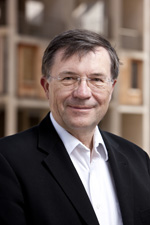Two Division of Biological Sciences Professors Elected to National Academy of Sciences
APRIL 27, 2010
By: Kim McDonald
The National Academy of Sciences today elected two biology professors and an engineering professor at the University of California, San Diego to membership in the prestigious National Academy of Sciences, one of the highest honors bestowed on U.S. scientists and engineers.
Susan S. Golden and Terrence J. Sejnowski, professors of biology, and Jack K. Wolf, a professor of electrical and computer engineering, were among the 72 new members and 18 foreign associates elected to the academy today "in recognition of their distinguished and continuing achievements in original research."
They join 86 current members of the UC San Diego faculty who previously had been named to membership in the academy, which was established by Congress in 1863 to serve as an official adviser to the federal government on matters of science and technology.
Major research universities use the number of academy members on their faculty as a benchmark by which to compare the strength of their scientific research and education programs among universities across the nation in different disciplines.

Susan Golden
"We are honored to have faculty of the caliber of Susan Golden and Terry Sejnowski among us and join in congratulating them," said Steve Kay, dean of the Division of Biological Sciences. "This powerful validation of their work, combined with two more recent elections to the academy that we have enjoyed in the division, point to how our research mission of contributing to health, the economy and the environment is being recognized worldwide."
Golden, a distinguished professor in the molecular biology section at UCSD and co-director of the university's new Center for Chronobiology, came to the San Diego campus in 2008 from Texas A&M University. An expert on the genetics of cyanobacteria, also known as blue-green algae, Golden received her bachelor's degree in biology from Mississippi University for Women and her Ph.D. in genetics from the University of Missouri. After postdoctoral research at the University of Chicago, she joined the biology faculty at Texas A&M in 1986, where she was promoted to distinguished professor in 2003.
Golden is also an expert on the basic biology of circadian rhythms, or biological clocks, and, as co-director of UCSD's Center for Chronobiology, she leads a campus-wide effort that brings together researchers studying the biological clocks of diverse groups of organisms, from bacteria to fungi to plants, to better understand the basic biology of circadian rhythms and apply that new understanding to a variety of human problems, from sleep disorders to obesity.

Terry Sejnowski
Sejnowski, a professor in the neurobiology section at UCSD, is also The Francis Crick Professor at the Salk Institute for Biological Studies, head of its Computational Neurobiology Laboratory and a Howard Hughes Medical Institute investigator. His research has focused on the hippocampus, believed to play a major role in learning and memory, and the cerebral cortex, which holds our knowledge of the world and how to interact with it. In his lab, Sejnowski and his colleagues use both experimental and computational modeling techniques to understand normal brain function and mental disorders, including Parkinson's disease and schizophrenia.
Sejnowski received his Ph.D. in physics from Princeton University. He was a postdoctoral fellow at Princeton University and the Harvard Medical School. He served on the faculty of Johns Hopkins University and was a Wiersma visiting professor of neurobiology and a Sherman Fairchild distinguished scholar at Caltech.
The academy's election was held this morning during the business session of the 147th annual meeting of the academy. Those elected today bring the total number of active members to 2,097. Foreign associates are nonvoting members of the academy, with citizenship outside the United States. Today's election brings the total number of foreign associates to 409.
The National Academy of Sciences is a private organization of scientists and engineers dedicated to the furtherance of science and its use for the general welfare. It was established in 1863 by a congressional act of incorporation signed by Abraham Lincoln that calls on the Academy to act as an official adviser to the federal government, upon request, in any matter of science or technology.
View additional information about the Academy and its members.
Related Links